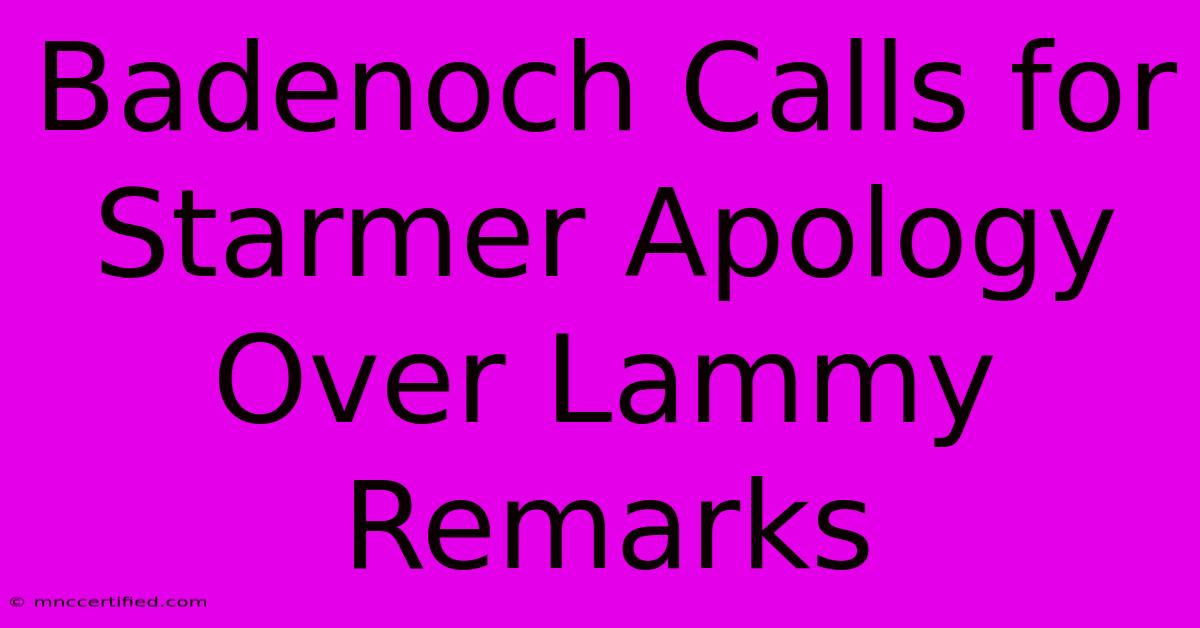Badenoch Calls For Starmer Apology Over Lammy Remarks

Table of Contents
Badenoch Calls for Starmer Apology Over Lammy Remarks: A Political Row Erupts
The Conservative Party has called for an apology from Labour leader Sir Keir Starmer after comments made by Shadow Foreign Secretary David Lammy regarding the UK's relationship with the African continent.
The Controversy:
The controversy began with a speech by Lammy at the Africa-UK Investment Summit in London, where he criticized the UK's approach to Africa, stating that it has been "too focused on aid and not enough on trade." Lammy's remarks, which were seen by some as critical of the Conservative government's foreign policy, sparked a backlash from the governing party.
Badenoch's Response:
Business Secretary Kemi Badenoch, who has previously spoken out against "woke" politics and "cancel culture," has been the most vocal critic of Lammy's comments. She described them as "insulting" and "patronizing," accusing Lammy of "talking down" to African leaders. Badenoch has demanded an apology from Starmer for Lammy's remarks, calling for him to "take responsibility" for his Shadow Foreign Secretary's words.
Labour's Response:
Labour has defended Lammy, arguing that his comments were not intended to be offensive and were simply a call for a "more balanced" approach to the UK's relationship with Africa. They have also accused the Conservatives of trying to "distract" from their own failings on the world stage.
Political Fallout:
The row over Lammy's comments has escalated into a wider political debate about the UK's role in Africa. The Conservative government has been criticized for its lack of investment in the continent, while Labour has been accused of neglecting the needs of African countries. The debate is likely to continue in the run-up to the next general election, with both parties vying for the support of voters who are increasingly concerned about global issues.
Key Takeaways:
- The controversy surrounding Lammy's comments highlights the ongoing debate about the UK's relationship with Africa.
- The Conservative Party is accusing Labour of being patronizing and disrespectful to African leaders.
- Labour is defending Lammy, arguing that his comments were simply a call for a more balanced approach to UK-Africa relations.
- The row has become a broader political debate about foreign policy and the UK's role in the world.
Future Implications:
The Lammy controversy is likely to have a lasting impact on the UK's political landscape. The Conservative Party will likely use this incident to attack Labour's credibility on foreign policy, while Labour will continue to criticize the government's approach to Africa. The debate is likely to continue in the run-up to the next general election, with both parties vying for the support of voters who are increasingly concerned about global issues.

Thank you for visiting our website wich cover about Badenoch Calls For Starmer Apology Over Lammy Remarks. We hope the information provided has been useful to you. Feel free to contact us if you have any questions or need further assistance. See you next time and dont miss to bookmark.
Featured Posts
-
Trump Wins 2020 Election Map
Nov 07, 2024
-
Shetlands Alison O Donnell On Episode 1s Impact
Nov 07, 2024
-
Clever Replacement For Perez In Shetland
Nov 07, 2024
-
Bitcoin Price Reflects Events During The 2020 Crisis
Nov 07, 2024
-
Personal Service Insurance Company Reviews
Nov 07, 2024